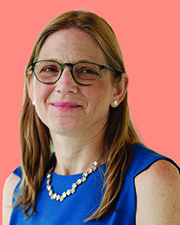
Senior Principal
Simpson Gumpertz & Heger
What was your greatest professional achievement or most notable project in the last 12 months? We are nearing the completion of a $100 million restoration of The Mother Church at The First Church of Christ Scientist (TFCCS) in Boston. I began working at TFCCS in 2004 as a junior project manager conducting initial assessments. Almost 20 years later, I get to see this iconic building returned to its glory as the principal in charge of the restoration that began in 2016. Not only have I grown, but I’ve also had the pleasure of watching a mentee of mine, Casey Williams, start and grow her engineering career on the project. Casey just became an associate principal at SGH and will continue our firm’s relationship with TFCCS. The AEC industry has also evolved. In 2004, women were a rarity in positions of authority. At the project’s close, the owner’s project manager, the contractor’s leadership team, the architect’s leadership team, and the engineer’s leadership team were all very capable, empowered women. Additionally, I was just named Simpson Gumpertz & Heger’s (SGH) first female chair of the board. I don’t actively seek management positions, but being in them allows me to think about our company’s vision and provides opportunities to positively impact people.
What tips or advice would you offer to other women who are considering entering the construction industry? Find great mentors and contacts you trust. I am grateful that women don’t have to prove their technical knowledge as much as they did many years ago, but we are still dealing with unconscious bias in the industry. It’s been so important to me to have a network of people—both inside and outside my organization—that I can rely on for a second opinion, discuss technical items, and encourage me. If there are young girls considering a career in the AEC industry, I encourage them to get dirty and try things hands-on. Yes, you’ll have to take your math classes, but experimenting with building something or engaging in other STEM activities will help you figure out if this is an industry that you’re interested in.
What made you interested in seeking a career in the AEC industry? I started as a computer science major in college but soon realized I preferred being outside instead of in a computer lab and wanted a job that was more engaged in a community. Civil engineering was a natural shift as I was exposed to building things from a young age—my father was a residential contractor, and my uncle was a civil engineer. My dad always encouraged me to explore and use his tools, so I was able to discover and learn from early on. I’ve always had an interest in historic buildings, so when I took some preservation courses in college, I realized that engineering is what fits best for me. I’ve also always had the desire to help people and I realized I could while supporting my community with this profession.
How are you involved in community organizations and/or charities? I’m involved by helping to preserve the past and encourage our future. Preserving historic buildings allows me to give back to my community by helping to preserve our cultural heritage. I love being able to point out to my family the buildings I’ve had a hand in preserving. I’m also proud to support a variety of historic preservation and STEM-focused groups and have encouraged SGH’s involvement with ACE Mentor. In addition to our employee’s volunteering and corporate sponsorship, we have been bringing an ACE student in as a summer intern for approximately eight years. It’s meaningful to expose someone to the profession and set them up for future success—and important to provide these opportunities to students who may not have had them without the program.








